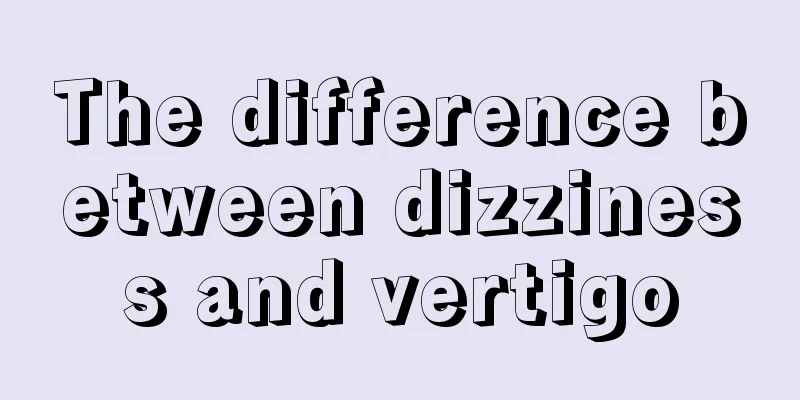The difference between dizziness and vertigo

|
In fact, many people cannot distinguish between vertigo, dizziness, and lightheadedness. People call it dizziness as long as they feel a little dizzy. This term is incorrect. If you go to the hospital for treatment, incorrect expression will cause trouble for the doctor when making a diagnosis. Below are the differences between dizziness, lightheadedness and vertigo. You can learn about their sensory differences so that you can better distinguish them in the future. 1. The feelings of vertigo, dizziness and lightheadedness are different 1. Vertigo: It is mainly paroxysmal and is a feeling (motion hallucination) that does not exist objectively but is firmly believed by the subject to be that oneself or (and) external objects are rotating or tumbling in a certain direction. The damaged target organ should be the nervous system from the semicircular canal ampulla crest of the inner ear labyrinth to the vestibule projection area of the brain, which is responsible for the balance function in movements such as rotation. 2. Dizziness: It is mainly characterized by a feeling of intermittent shaking when walking, standing, sitting or lying down, or when looking at things. The damaged target organs are respectively (or simultaneously) proprioception, vision, otolith sense (responsible for balance function in static and linear motion) and other related (mainly neural) systems. 3. Dizziness: Mainly characterized by a persistent feeling of grogginess or confusion in the head. The damaged target organ is the cerebral cortex, which is responsible for human higher neural activities. 2. The pathogenesis of vertigo, dizziness and lightheadedness is different The spatial balance of the human body in static and dynamic movements is mainly achieved through the coordinated action of the vestibular sense (crista ampullae and otoliths), proprioception and visual system, under the strict regulation of the cerebral cortex, thus ensuring a stable, accurate body position and clear vision in various static and dynamic continuous movements. Among them, the vestibular system is the most important, with less neuronal exchange and faster information transmission loop. 1. Dizziness: The onset of vertigo is mainly caused by different parts of the nervous system from the semicircular canal ampullary ridge to the cerebral cortex, which are subjected to artificial (rotation and semicircular canal function test) or pathological damage, causing unilateral or bilateral excitability increase (stimulation of lesions), decrease (destruction of lesions) or/and severe symmetrical disorder of bilateral functions. The vestibular system continuously sends "false" information such as the body is rotating or rolling to the cerebral cortex, inducing the cerebral cortex to make wrong judgments and regulatory disorders. 2. Dizziness: Dizziness is mainly caused by single or combined lesions of proprioception, vision or otolith sense, which leads to distortion of information input of single or multiple systems of peripheral sensory nerves, and lack of coordination and loss of control of brain regulation, causing a sense of instability in linear motion or vision. Dizziness only occurs or worsens during exercise or vision; the symptoms automatically ease or disappear once the activity or vision stops, or when sitting or lying down or closing the eyes. When proprioception and/or otolith sense are dysfunctional, as long as the visual function is normal, no symptoms may occur when the eyes are open. However, dizziness and balance disorders may occur once the eyes are closed or in a dark place, indicating the important role of visual compensatory function in body activities. 3. Dizziness: Dizziness is a clinical symptom caused by the intensity of the excitability and inhibition of the cerebral cortex, the flexibility and continuity of mutual conversion and mutual induction, and the reduction of internal and external reactivity and continuity, leading to a general decline or weakening of the overall cerebral cortical function. Dizziness is persistent, sometimes mild and sometimes severe. It improves with rest, reduced stress and a good mood, but may worsen otherwise. |
<<: What are the methods to lower transaminase in medical examination?
Recommend
How to suppress hunger noises
When people are too hungry, their stomachs will m...
What to do with advanced prostate cancer
Prostate cancer is a disease with a great impact,...
Can liver function screening detect liver cancer? Which types of people are at high risk of liver cancer?
Liver cancer is a malignant tumor with a high inc...
What are the functions and effects of tocopherol
We need to pay special attention to the things us...
Can viral hepatitis be cured?
Viral hepatitis is caused by many types of viral ...
CT can detect nasopharyngeal cancer. What should we pay attention to in our daily diet?
As a common disease in life, nasopharyngeal carci...
Traditional Chinese medicine prescriptions available for lung cancer patients
Lung cancer is a highly prevalent malignant tumor...
The correct way to apply lotion
Whether the effect of women's makeup is good ...
Is lung adenocarcinoma lung cancer?
Is lung adenocarcinoma lung cancer? 1. Lung adeno...
Efficacy and function of folic acid tablets
Folic acid tablets are mainly drugs extracted fro...
Which department should I go to if I feel stomach discomfort
Almost 70% of people suffer from gastrointestinal...
How to treat stroke?
Stroke is a disease, and the most common one is p...
Floral water treats body odor
In our daily lives, we always find that some peop...
Are you one of the top 10 bad habits that damage your teeth?
Are your teeth okay? The most common dental probl...
Gastric cancer favors people from Northeast China
Gastric cancer is one of the most common malignan...









